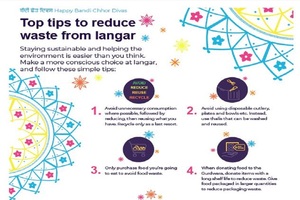Environment Agency encourages Sikh community to reduce plastic waste
Sikh festivals are at the heart of a diversity project encouraging sustainable behaviour changes during faith-based celebrations.

Top tips to reduce waste from langar - one of the posters encouraging the Sikh community to reduce plastic waste
The Environment Agency is working with its employee Sikh Fellowship, and community interest group Eco-Sikh UK, on a series of printed posters to be displayed in Gurdwaras (places of worship), as part of its Interreg Preventing Plastic Pollution (PPP) work.
The aim is to reach wider audiences with its avoidable plastics message, having launched the diversity project earlier this year with Festival of Eid posters for Islamic communities.
Three themed posters in English and Punjabi have been created, giving tips on ways to reduce avoidable plastic waste during Bandi Chhor Divas. They focus on food waste, candles and decorations, and fireworks.
Environment Agency project lead Claire Horrocks said:
Sikh families from across the world will soon come together to mark Bandi Chhor Divas (4 November) – an important festival in the Sikh calendar that coincides with climate change conference COP26 this year.
What better time to share positive ideas for sustainable celebrations and encourage people to reduce waste. Regardless of faith, everyone can learn from the messages in these posters, be kinder to our planet, and help protect the environment from further harm caused by plastic pollution.
Eco-Sikh representative Amandeep Kaur Maan said:
This is an important collaboration between the Environment Agency and Sikh communities all over the UK to help get the message about climate change out there.
Bandi Chhor Divas is a time to reflect on how our actions affect the world. Just as our Guru demonstrated selflessness in the way he helped others, we too should carry his message forward. This is by being responsible when celebrating so that we don’t harm the environment.
Environment Agency Sikh Fellowship representative Jatinder Singh Mehmi said:
The Sikh Fellowship represents Sikh colleagues within the Environment Agency who want to play an active part in promoting sustainable celebrations to their family, friends and their wider community. We’re delighted to be working with Eco-Sikh UK in this endeavour.
In future, the Environment Agency’s plastics and sustainability team also hopes to highlight festivals from other faiths, including Hindu and Jewish celebrations.
As a regulator, the Environment Agency prevents waste plastic entering the environment by cracking down on waste crime and poor waste management. As an influencer, its ambition is to promote better environmental practices that result in a reduction of plastic waste, helping to achieve the goals and commitments outlined in its 5 year plan to create better places for people, wildlife and the environment, and the government’s 25 year environment plan.
The Environment Agency is also a member of Preventing Plastic Pollution - a partnership of 18 organisations in England and France, aiming to reduce the impact of plastic pollution in river and marine environments, which includes embedding behaviour change in local communities.
Notes to editors
Interreg Preventing Plastic Pollution: Working in partnership with 18 organisations from across France and England, Preventing Plastic Pollution (PPP) seeks to understand and reduce the impacts of plastic pollution in the river and marine environments. By looking at the catchment from source to sea, the project will identify and target hotspots for plastic, embed behaviour change in local communities and businesses, and implement effective solutions and alternatives.
PPP is a €14million funded EU INTERREG VA France (Channel) England Programme project co-financed by the European Regional Development Fund which works mainly across seven pilot sites: Brest Harbour, Bay of Douarnenez, Bay of Veys, Poole Harbour, and the Medway, Tamar, and Great Ouse estuaries.
Partners are the Environment Agency, Department for Environment, Food and Rural Affairs, Queen Mary University of London, LABOCEA Conseil, Expertise et Analyses, Syndicat mixte établissement public de gestion et d’aménagement de la baie de Douarnenez, Office Français De La Biodiversité, Parc naturel marin d’Iroise, Brest Métropole, Centre national de la recherche scientifique, Counseil départemental de la Manche, Institut français de recherche pour l’exploitation de la mer, The Rivers Trust, Syndicat de bassin de l’Elorn, ACTIMAR, Brest’aim, Westcountry Rivers Trust, South East Rivers Trust, and Plymouth City Council.
Eco-Sikh UK: Eco-Sikh UK is a unified inter-faith response to help combat climate change, global warming and bio-diversity loss. Eco-Sikh UK is a non-profit organisation which is part of a wider global climate action programme by Eco-Sikh – the Sikh community’s contribution to the United Nations Development Programme (UNDP)/Alliance of Religions and Conservation (ARC) Plans for Generational Change Project.